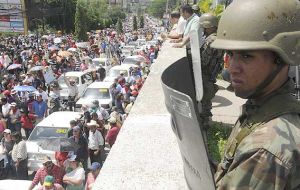MercoPress. South Atlantic News Agency
Zelaya insists in returning to Honduras; Catholic Church warns of “bloodbath”
 The worst Central American crisis since the US invasion of Panama in 1989
The worst Central American crisis since the US invasion of Panama in 1989 Ousted President Manuel Zelaya has vowed to return to Honduras on Sunday, despite being threatened with arrest. The Honduran Catholic Church called on all parties to avoid a “blood bath”.
In a speech on the regional TV channel, Telesur, Mr Zelaya said he would arrive along with several other presidents.
Zelaya, who was forced out by the military on Sunday, criticised the leaders of the interim government and described them as traitors.
Meanwhile on the Organization of American States was holding late Saturday an extraordinary session and is expected to vote to suspend Honduras.
“I am organising my return to Honduras... This is the return of the president elected by the sovereign will of the people,” he said, calling on his followers to join him “without arms” on his arrival in the capital Tegucigalpa.
Thousands of his supporters are expected to turn up at the capital's airport for his planned arrival.
In the taped recording that was sent to Telesur, Mr Zelaya warned the new administration of interim leader Roberto Micheletti that the international community had turned against them.
“I address you, the coup leaders, traitors, 'Judases' who kissed me on the cheek only to afterwards give a great blow to our country and our democracy... Your actions will not go unnoticed because the international courts will have to try you for the genocide that you are carrying out in our country, in suppressing rights and repressing our people.”
The Honduran interim government says it acted within the law and has the backing of the majority of the population.
Earlier, the leader of the Roman Catholic church in Honduras called on the ousted president not to return from exile, in order to avoid provoking what he called a “bloodbath”.
Cardinal Oscar Rodriguez said nobody had been killed since Mr Zelaya lost power, and he appealed to him to check his actions, before it was too late.
“I know you love life, I know you respect life. Until now, not one Honduran has died, please meditate your decision before it is too late” he implored.
The presidents of Ecuador and Argentina, Rafael Correa and Cristina Fernandez de Kirchner, have said they would accompany Mr Zelaya when he returns to Honduras on Sunday.
The Honduran government says that arrest warrants have been despatched to all frontiers.
Mr Zelaya, whose enemies accuse him of seeking to prolong his rule by altering the Honduran constitution, has garnered comprehensive international support.
On Friday OAS Secretary General Miguel Insulza travelled to Tegucigalpa and met with the Honduras Supreme Court. Back in Washington he said there were no conditions for the return of Zelaya, and few options other than to suspend Honduras.
The interim rulers have renounced the OAS charter in an apparent pre-emptive move, but an OAS official said the renunciation was not valid, since the Honduras authorities were not a legitimate government.
“The suspension is complicated by the effects it will have, above all, from the economic point of view in times of crisis” Insulza told Chilean radio. “It is not something to be undertaken lightly, but there is not much alternative”.
Zelaya elected president on a Liberal ticket soon changed strategy and established closer ties with populist regimes of Latinamerica such as Venezuela, Ecuador and Bolivia, and promoted a referendum to modify the constitution and to allow re-election.
His proposal was rejected by the Supreme Court, Congress, his won Liberal Party and finally the Army that flew him out of the country to neighbouring Costa Rica in what was known as the “pyjama coup”. But his ousting has created Central America's gravest political crisis since the US invasion of Panama in 1989.
Honduras, an impoverished coffee and textile exporter, would be only the second country suspended by the Western Hemisphere's top diplomatic body after Cuba, which was barred in 1962 as Fidel Castro took the island toward communism. OAS suspension complicates access to multilateral loans and credits for Honduras, the third poorest country in the Americas after Nicaragua and Haiti




Top Comments
Disclaimer & comment rulesCommenting for this story is now closed.
If you have a Facebook account, become a fan and comment on our Facebook Page!